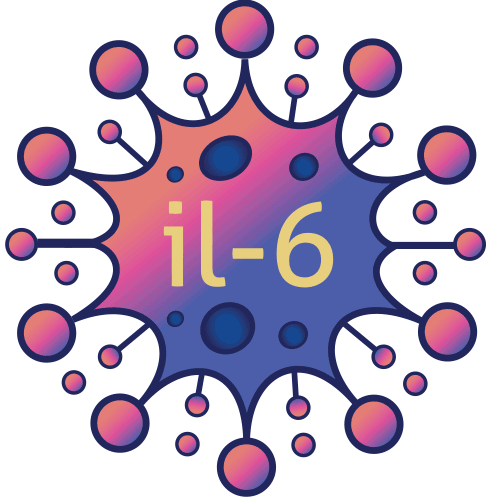Schizophrenia: The Link to IL-6
- From The Mind of AI

- Nov 17, 2024
- 4 min read
Updated: Dec 30, 2024

Schizophrenia is a complex mental health disorder characterized by symptoms like hallucinations, delusions, disorganized thinking, and cognitive impairments. Research has increasingly pointed to inflammation, particularly involving the cytokine Interleukin-6 (IL-6), as a contributing factor in schizophrenia. Elevated IL-6 levels may exacerbate symptoms by disrupting brain function and neurotransmitter balance, ultimately affecting cognition and emotional regulation in individuals with schizophrenia.
What is IL-6?
Interleukin-6 (IL-6) is a cytokine involved in the body's immune response. It plays a critical role in inflammation, which is essential in short-term immune reactions but can be harmful when prolonged. In schizophrenia, elevated IL-6 levels have been observed in both blood and cerebrospinal fluid, indicating a state of chronic neuro-inflammation that may affect brain regions linked to perception, cognition, and emotional regulation.
IL-6 and Schizophrenia Research
Studies show that individuals with schizophrenia often have higher IL-6 levels compared to the general population. This elevated IL-6 is associated with neuro-inflammation, which can disrupt brain regions like the prefrontal cortex, impacting decision-making, social cognition, and emotional regulation. Additionally, IL-6 is thought to contribute to dopamine dysregulation, a key neurotransmitter pathway implicated in schizophrenia. By targeting IL-6 and reducing neuro-inflammation, researchers are exploring new approaches to alleviate symptoms and improve cognitive function in individuals with schizophrenia.
Supplements to Reduce IL-6 Levels
Supplement | Dosage | Mechanism | Benefits |
NAD+ (Nicotinamide Adenine Dinucleotide) | 300 mg to 600 mg per day | Supports cellular energy and reduces oxidative stress. | Reduces IL-6, supports cognitive function, and may improve mood stability and energy. |
Curcumin (Turmeric Extract) | 500 mg to 1,000 mg per day | Anti-inflammatory, reduces IL-6 and oxidative stress. | Alleviates neuroinflammation, improves cognitive health, and may help with symptom management. |
Omega-3 Fatty Acids (EPA and DHA) | 1,000 mg to 2,000 mg per day | Anti-inflammatory, supports neurotransmitter regulation. | Reduces IL-6, enhances mood stability, and supports cognitive function. |
Magnesium | 300 mg to 400 mg per day | Regulates neurotransmitter function and lowers IL-6. | Calms the nervous system, reduces anxiety, and supports better sleep. |
Vitamin D | 2,000 IU to 5,000 IU per day (based on blood levels) | Supports immune regulation and reduces inflammation. | May improve mood, reduce IL-6, and support brain health. |
Probiotics | 10 billion CFUs per day | Reduces systemic inflammation through the gut-brain axis. | Lowers IL-6, supports gut and mental health, and may improve cognitive clarity. |
Resveratrol | 100 mg to 250 mg per day | Antioxidant, lowers IL-6 and oxidative stress. | Protects brain cells, reduces inflammation, and may help with cognitive symptoms. |
N-Acetylcysteine (NAC) | 600 mg to 1,200 mg per day | Increases glutathione, reduces oxidative stress and IL-6. | Supports mental clarity, reduces anxiety, and may improve cognitive symptoms. |
Lithium Orotate | 5 mg to 20 mg of elemental lithium per day | Modulates neurotransmitter activity, reduces IL-6, and has neuroprotective effects. | Helps stabilize mood, reduces aggression, supports cognitive function, and may improve emotional regulation. |
Lifestyle Modifications to Reduce IL-6 Levels
Lifestyle Modification | Explanation | Recommendations |
Anti-Inflammatory Diet | Reduces IL-6 and supports brain health by avoiding inflammation-triggering foods. | Eat leafy greens, berries, nuts, olive oil, whole grains, and fatty fish. Avoid processed foods, sugars, and trans fats. |
Regular Physical Activity | Reduces IL-6, improves mood, and enhances neuroplasticity, supporting brain health. | Aim for at least 30 minutes of moderate exercise (walking, swimming, yoga) most days of the week. |
Stress Management | Chronic stress elevates IL-6 and worsens schizophrenia symptoms. Reducing stress helps lower inflammation. | Practice meditation, deep breathing, or mindfulness daily. Avoid overstimulation and create a calming environment. |
Adequate Sleep | Quality sleep reduces IL-6 and improves cognitive function, essential for managing schizophrenia. | Aim for 7–9 hours per night. Keep a consistent sleep schedule and address any sleep disorders, such as insomnia. |
Social Support and Connection | Isolation increases stress and inflammation, while social interaction can improve mood and cognitive health. | Engage with family, friends, or support groups. Consider therapy or community programs to build social connections. |
Hydration | Dehydration can worsen cognitive and emotional symptoms. | Drink at least 8 glasses of water per day, more if physically active. |
Limiting Alcohol and Caffeine | Both substances can increase anxiety, disrupt sleep, and elevate IL-6 levels. | Limit intake, especially in the evening, to avoid exacerbating symptoms. |
Time in Nature | Nature exposure reduces IL-6 and stress, improving mood and cognitive clarity. | Spend at least 20–30 minutes outdoors each day in a calming, natural environment. |
Cognitive Behavioral Therapy (CBT) | Helps manage symptoms by addressing anxious thoughts and behaviors, lowering stress and inflammation. | Seek guidance from a CBT-trained therapist or explore self-guided CBT techniques. |
Encouraging Thoughts on Treatment
The relationship between IL-6 and schizophrenia opens up new possibilities for managing this challenging condition. By focusing on reducing inflammation and oxidative stress, individuals with schizophrenia can potentially alleviate symptoms and improve cognitive function. The holistic approach of combining anti-inflammatory supplements with lifestyle modifications provides a promising path to better mental and emotional health. Although schizophrenia is a complex disorder, reducing IL-6 levels offers a tangible way to support the brain and improve resilience. With ongoing research, more effective treatments targeting neuro-inflammation may emerge, bringing hope for a brighter, more stable future for those affected by schizophrenia.




Comments